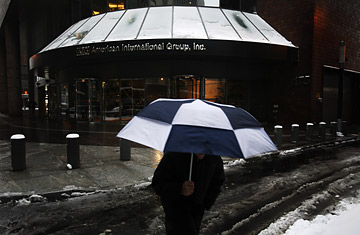
A man leaves AIG offices in New York
It's not hard to understand why most observers expect Wall Street to slide fast and far during trading Monday. It opened with an opening dive — its first dip below the 7,000 point bar in more than a decade. And why would the Dow resist the mega-tanking that bourses elsewhere experienced today, amid a flurry of dismal financial and economic news from virtually every corner of the globe?
Even before Wall Street's opening slump of 1.66%, prices on European exchanges suffered serious erosion, with London's FTSE 100 down 4.2%, Paris' CAC 40 by 3.6%, and Frankfurt's Dax index 2.8%. The trio closed Monday trading with losses of 5.33%, 4.48%, and 3.48% respectively. The European shrinkage followed Asia's lead, with Tokyo's Nikkei index dropping 3.8%, Hong Kong's Hang Seng off 3.9%, Sydney's All Ordinaries falling 2.8%, and Mumbai's BSE Sensex down 3.69%. (See pictures of the global financial crisis.)
Evidence of just how bad the global recession is shaping up to be is building fast. The worst of the news Monday came with the announcement that financial insurance giant American International Group had lost $61.7 billion in the last quarter of 2008, the largest quarterly loss in corporate history. As the insurer of much of the toxic American mortgage debt that detonated the implosion of the world's finance markets, AIG is now also set to take on an additional $30 billion in U.S. government rescue funding beyond the record-setting $150 billion in aid it received last year.
That toxic debt was also behind the other bad company news of the day, when HSBC — Europe's largest bank — said it would seek $17.1 billion in new capital, and close its U.S. consumer-lending unit, Household Finance. The American affiliate had saddled HBSC with $16.3 billion in subprime-rooted losses, and explained the group's 62% dip in 2008 profits of $9.3 billion. But closing the troubled unit means adding its 6,100 employees to the list of 3 million American jobs eliminated since November.
The mere fact HSBC turned a profit despite its troubles was a small ray of light amid an otherwise bleak outlook. New figures covering January showed industrial output falling more than anticipated in the eurozone; joblessness rose from 8.1% in December to 8.2% in January, nearly a full percentage point higher than the same month last year. (Find out 10 things to do with your money.)
That's bound to get worse. French Economy Minster Christine Lagarde on Monday said she expected France to suffer 300,000 job cuts in 2009 — a figure independent analysts says massively underestimates the figure they predict, which is closer to 900,000. Speculation is also rising that several central European countries — Hungary foremost among them — may soon need bailing out by fellow European Union members to avoid economic collapse.
Asia offered no joy either. Manufacturing data released Monday made it clear the global recession was undermining the previously robust Chinese economy. It wasn't the only one suffering. Japan reported a steep drop in car sales, while South Korea said it was experiencing the same kind of.
All that dismal news and more explained why the downward spiral of global stock markets is expected to continue — including Wall Street's return to the sub-7,000-point level it last visited in 1997. Some stock market analysts believe the Dow could actually dip under its 5,000 mark of 1995 if things get worse. Billionaire investment guru Warren Buffett warned his investors over the weekend that "the economy will be in shambles throughout 2009 — and, for that matter, probably well beyond". Still, Buffet went on to note that despite that terrible economic outlook overall, it "does not tell us whether the stock market will rise or fall". Apart from Monday, that is.
